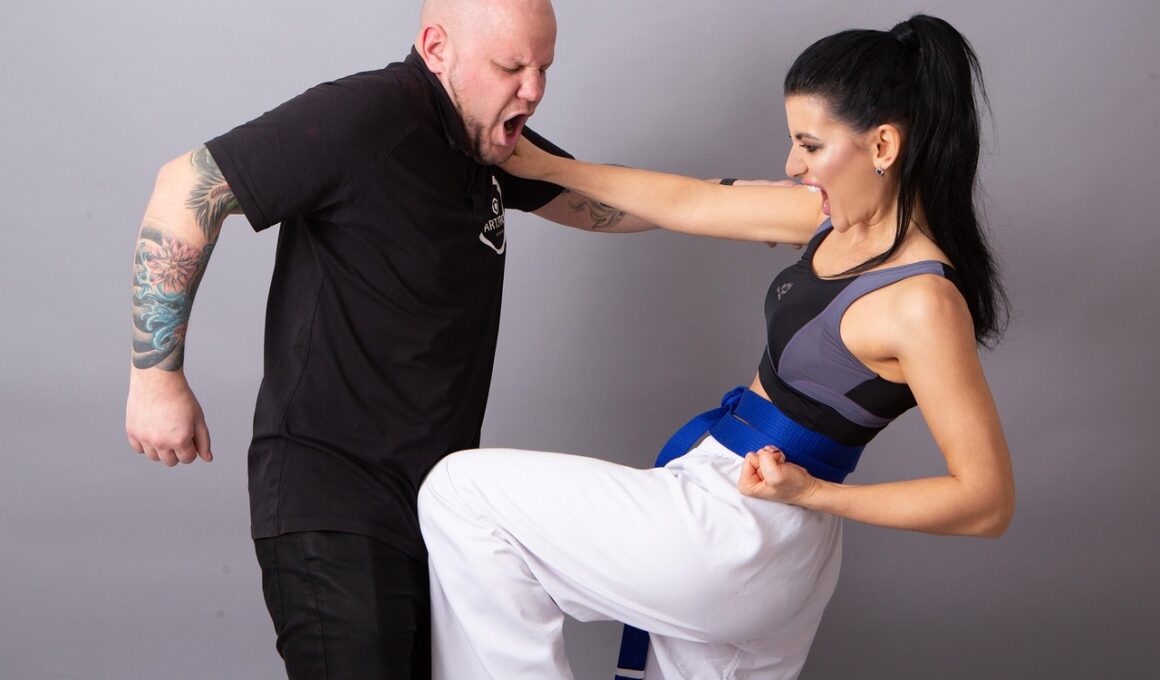The Importance of Regular Practice After Self-Defense Events
Attending self-defense events and workshops can significantly enhance your skills and confidence. However, the real transformation occurs when you incorporate regular practice into your routine. Practicing consistently enables you to retain the techniques learned during events, facilitating muscle memory and increasing effectiveness in real-life scenarios. Taking part in these workshops might leave you feeling empowered, but this empowerment can fade without ongoing practice. Regular sessions reinforce key concepts and ensure retention over time. Whether you start a practice group or continue independent training, the commitment to evolving your skills is crucial. Consider scheduling weekly sessions with fellow attendees or investing in private lessons. This atmosphere allows for camaraderie and feedback, further enhancing your learning experience. Don’t shy away from experimenting with various techniques, as learning does not happen in isolation. Repetition is vital; it transforms beginners into competent practitioners. As you practice, you’ll gain confidence and refine your techniques, ensuring you’re ready when faced with a potential confrontation. Diligently honing these skills empowers you to respond assertively, ensuring both your safety and that of others in challenging situations, boosting overall self-defense competency.
To maximize the benefits of attending these self-defense events, understanding the intricacies of specific techniques is essential. Each self-defense move is designed for particular scenarios, and knowing when to apply them is vital. Workshops often provide attendees with an overview of numerous techniques, yet they may not delve deeply into individualized skill development. Therefore, after these events, dedicate time to practice movements relevant to your lifestyle and environment. Identify personal vulnerabilities that could arise in your daily life. Focus on techniques that address these concerns effectively. Supplement your practice with supplementary resources, both online and offline, offering videos and educational materials to guide your training. It’s important to engage in diverse training environments to simulate unpredictability and enhance adaptability. Consider varying your practice locations, training partners, and weather conditions to better prepare for real-world situations. Emphasizing adaptability ensures that you are equipped not just with techniques but also the mental fortitude needed in a crisis. Regular practice complements the skills gained during events, solidifying your readiness. Thus, turn the knowledge from these events into a consistent routine that sharpens your awareness and response capabilities.
Building Physical and Mental Resilience
Regular practice also contributes significantly to building both physical strength and mental resilience. Self-defense techniques often require physical conditioning, which can only be achieved through consistent training. As you integrate routine workouts alongside practical sessions, you’ll notice improvements in your stamina, strength, and overall fitness level. Additionally, practicing self-defense regularly enhances your reflexes and coordination, making you more adept at responding quickly in emergencies. Mental resilience is equally important; simulating high-pressure situations during practice can heighten your ability to stay calm. Regularly placing yourself in strenuous scenarios prepares your mind for actual confrontations, allowing instinctive responses rather than panic. Being physically fit and mentally prepared gives you the upper hand in self-defense situations, as well as daily life challenges. Achieving such resilience takes time and dedication, but the rewards are tremendous. You’ll foster not only an improved ability to defend yourself but also an increased sense of control over your environment. Additionally, engaging in a supportive community reinforces this resilience further, propelling you toward success. Therefore, view self-defense practice as an embodiment of empowerment, reshaping your capacity to navigate life with greater confidence.
Moreover, regular practice enhances situational awareness, which is crucial for any self-defense strategy. Awareness involves understanding your environment and recognizing potential threats before they escalate. Participating in various self-defense events can introduce you to strategies for improving awareness, but constant application is necessary for true mastery. During practice sessions, engage with your surroundings critically; train your mind to assess situations, identifying risks and escape routes proactively. Use drills that simulate real-life environments to develop this skill further; the more you immerse yourself in such scenarios, the better prepared you will be in an actual encounter. Partnering with others during practice can elevate this experience, as you discuss potential dangers and collective strategies. Incorporate mock conflict situations that require every participant to think quickly, responding effectively. A continued focus on situational awareness enables you to notice subtle cues in various environments, enhancing your ability to stay alert. Workshops provide foundational knowledge, but maintaining this practice is where the true augmentation of your self-defense skills occurs. By doing so, you’re equipping yourself with the ability not only to react but also to prevent dangerous scenarios from developing in the first place.
Gaining Confidence Through Consistency
One of the most notable benefits of regular self-defense practice is the boost in confidence among participants. After attending an event, many individuals feel a surge of motivation; yet, that feeling can diminish without continuous effort. By establishing a routine that includes practicing techniques regularly, you reinforce your newfound skills while cultivating a strong self-image. Confidence emerges not just from executing techniques correctly but also from the understanding that you can protect yourself if the need arises. Each practice session builds on the last, demonstrating progress. Celebrate small achievements, whether mastering a specific move or improving performance in sparring sessions. This reinforcement fosters a sense of accomplishment, leading to greater self-trust. Confidence generated through practice transcends martial arts, positively influencing various life aspects. As you develop assertiveness in self-defense, this attitude can extend to personal and professional realms. Reflect on your journey, acknowledging growth experienced through consistent effort. This holistic development is essential, as self-defense is not merely a set of physical skills; it’s a transformative process enhancing your overall quality of life.
Moreover, self-defense is a communal activity, and regular practice can strengthen bonds among participants. Building a network of training partners encourages accountability and motivation, making the practice more enjoyable. Group training sessions not only improve efficacy through shared knowledge but also foster camaraderie—an essential aspect of any learning process. Engaging with others who share similar goals cultivates an environment where everyone benefits. As you practice alongside peers, you can exchange feedback, share tips, and celebrate milestones together. This collective experience enriches your journey, creating lasting friendships that extend beyond the training mat. Furthermore, enjoying these interactions can significantly improve your overall commitment level, leading to even more regular practice. Join online forums or local clubs associated with your workshops to connect with fellow practitioners. These connections can facilitate the organization of practice meet-ups, workshops, and events, reinforcing your skills. Gaining insight from others’ experiences and perspectives broadens your understanding of self-defense techniques. Ultimately, the social aspect combined with your regular practice creates a supportive atmosphere essential for personal growth and the development of effective self-defense capabilities.
Measuring Progress and Adjusting Techniques
Finally, regular practice allows you to measure your progress, fostering a growth mindset vital for improvement. After attending workshops, it’s common to feel inspired, but translating that enthusiasm into tangible results requires a deliberate structure. Regular feedback from training partners offers insight into the efficiency of your techniques while allowing you to refine them accordingly. Set specific, measurable goals to maintain your focus; whether achieving a certain level of proficiency or preparing for competitions, these objectives guide your practice. Video recordings of your sessions enable self-analysis, providing a visual reference for progress and areas needing attention. Such metrics nurture realistic expectations and enhance motivation, driving participants forward. Additionally, adjusting techniques based on personal and situational needs is necessary for effective self-defense. With each practice session, employ different techniques to gain deeper understanding. Evaluating your performance afterwards aids in skill refinement. This conscious approach underscores the importance of continual learning. Ultimately, self-defense isn’t just about the event—it’s about taking these experiences and embedding them into a lifestyle characterized by regular practice, resilience, and a commitment to self-improvement.
In summary, regular practice after self-defense events is indispensable for anyone committed to self-improvement and personal safety. The continuous application of learned techniques reinforces confidence, mental resilience, and situational awareness. Cultivating these attributes provides individuals with a deeper understanding of self-defense, transforming workshops into meaningful experiences. Involving peers in practice sessions not only enhances learning but also builds camaraderie, enriching the overall journey. Furthermore, reflecting on progress through regular assessment ensures that you stay focused on skill enhancement. Ultimately, self-defense is a lifelong journey that necessitates ongoing effort. Embrace the commitment to regular practice, and reap the rewards of empowerment and skill. Carry the momentum beyond the events, shaping a confident, resilient self ready to face life’s challenges. Practice not only sharpens skills but also solidifies your identity as a proactive defender of your own safety and well-being. In every practice session, consider the personal aspects tied to your journey and amplify those connections. The key takeaway is that self-defense training is not a short-term endeavor but a crucial element in crafting a safer, more prepared individual. Prioritize practice as an essential life skill, and embark on this transformative journey with determination and commitment.


